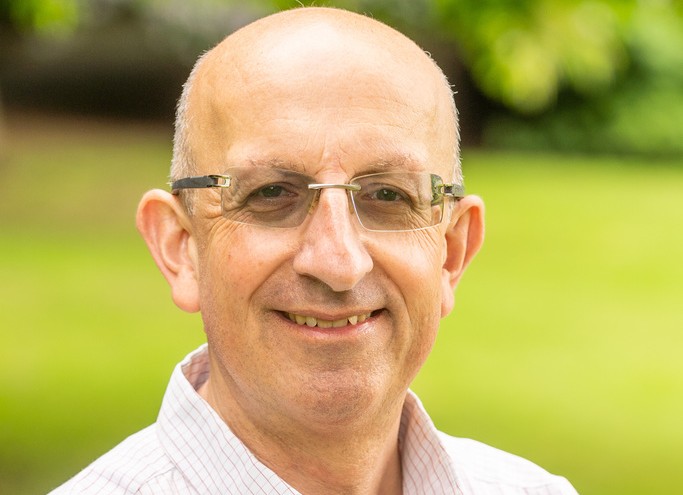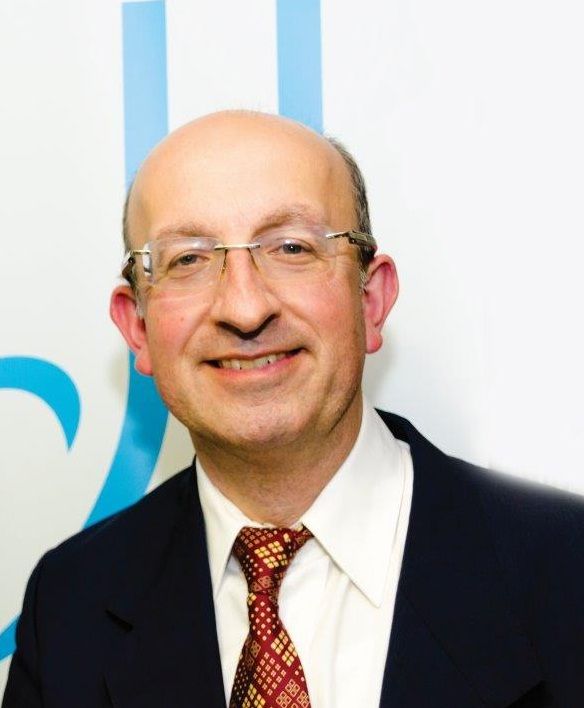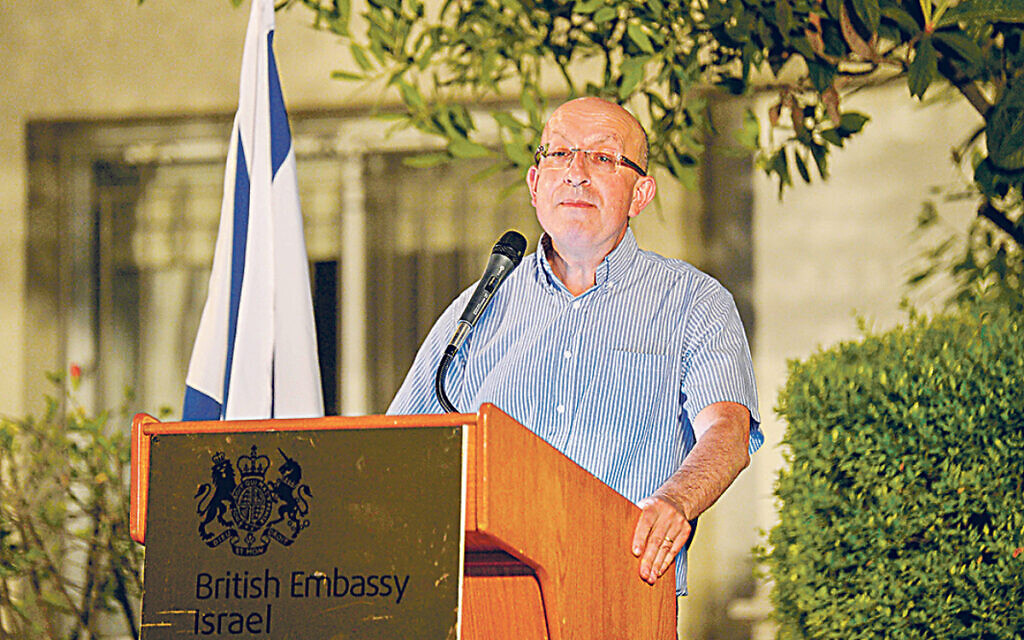New Board chief Michael Wegier: ‘We are not a community of extremes’
'Passionate moderate' says anyone trying to drag the 260-year-old umbrella organisation of British Jews away from the centre ground on his watch ‘will find trouble’
New Board of Deputies chief-executive Michael Wegier has described himself as a “passionate moderate” – and revealed his determination to ensure the communal organisation continued to reflect what he believes is the majority opinion amongst UK Jewry.
In his first major interview since being appointed to the CEO role at the Board, Wegier admitted he was “concerned” there has been a “sharpening of views on both left and right” within the community recently, particularly over issues such as Israel.
But he also stressed his belief that the “majority of British Jews” retain opinions and political views well away from the extremes – and insisted the Board needed to ensure it positioned itself to reflect this.
Get The Jewish News Daily Edition by email and never miss our top stories Free Sign Up
In a revealing interview, Wegier also admitted he had previously underestimated how influential a body the Board actually was – both to Jews in this country and those abroad, and to wider civil society.
Asked by Jewish News about the often thorny topic of relations with the Jewish Leadership Council (JLC) communal body, Wegier said he did not believe a merger with the Board was a “desirable option” nor was it “even on the cards right now. ”

He also expressed some relief, that after the progress made at Sir Keir Starmer’s leadership, the Board’s role was to now “watch closely” the path taken by Labour, rather than to react angrily as had been the case under Jeremy Corbyn.
The Palmers Green, north London, born communal leader, educator and long-time ex United Jewish Israel Appeal (UJIA) chief exec, had initially been appointed as interim chief exec at the Board in April, following Gilliam Merron’s departure to the House of Lords.
But his full-time appointment in the role, which Wegier said was “not a foregone conclusion” , was then confirmed last month.
Six months on from starting at the Board, Wegier’s obviously passionate belief that most Jews do not attach themselves to extreme positions repeatedly shone through as he spoke.
But over the past twelve months, he also admitted he had become “very concerned” that “quite bitter” arguments had emerged amongst some British Jews.
There had been, he admitted, tensions within the Board itself as elections were held in May for the role of President after the incumbent Marie van der Zyl faced an unexpected challenge from Jonathan Neumann.
Then, again in May, the latest conflict between Israel and Hamas, exposed further tensions within the community over the Jewish state and relations with the Palestinians.
“I really don’t like the fact that sometimes these arguments have become a little bit too bitter,” said Wegier. “That did come out in the Board election.
“My inclination is to be quite centrist – I am very passionate about Israel – but I’m a passionate moderate.

“I am very strongly committed to the Jewish people, to Israel, to Zionism. But on all of those issues I am a centrist. I don’t like extremes in any direction.
“I don’t think extremes are good for the Jewish community – or indeed the Jewish people.
“I will work with anybody in this community, of course. That’s the role – I can work with people who are left-wing, or who are right-wing.
“But I always want them to recognise the majority of the Jewish community are actually around the centre. Some are centre-left, some are centre-right.
“Anyone who tries to drag the Board in either direction is going to get into trouble.
“I think we are proudly pro-Israel – but if I was to find an average Mr or Mrs Jew, we are not on the extreme right or on the extreme left.”
“My inclination is to be quite centrist – I am very passionate about Israel – but I’m a passionate moderate.
Wegier said he had now set himself the mission “decreasing the tension around the politics of Israel” – although he is not of the view that recent internal arguments within the community are unprecedented.
“Things flair up from time to time,” he reflects, highlighting the huge split amongst UK Jewry in the 1920s over the very merits of Zionism itself. With the rise of the Nazis, the Second World War, and emergence of Israel as a state, things would calm down again for some time. But tensions would emerge again after the Six Day War of 1967 and the 1982 Lebanon War – only to calm once again when the Oslo Accords appeared to offer the prospect of peace between Israel and the Palestinians.
Observing there has once again been “a sharpening of views on both left and right” Wegier pointed to those involved with what he describes as “advocacy groups” as being amongst those who are “pretty sharp in their opinions.”
While he “applauds the passion and energy” of those on the left and right, Wegier said there needs to be attempts made by organisations such as the Board to “do what we can to lower the tensions.”
I think we are proudly pro-Israel – but if I was to find an average Mr or Mrs Jew, we are not on the extreme right or on the extreme left.
In a clear rebuke to the hot-heads he added: “All of us should have the interests of the Jewish people and of Israel in our hearts.”
Wegier’s experience of working for communal organisations in the UK, Israel and America, means he is well qualified to make such assessments.
In total he had spent around 15 “wonderful” years at UJIA, half of these as chief exec, also as director of programmes and as an educator. Prior to that he served as chief executive of the Melitz Educational Centres in Israel.
For three years he had taught at Baltimore’s Jewish Community Centre in the United States.
Growing up in leafy Palmers Green, Wegier’s parents had been members of the Brownlow Road shul, which he says had been “my community” ahead of his decision to make aliyah in 1990.
He met his Chilean-born wife Daniela Greiber in Jerusalem, while they both worked for the Jewish Agency. Their three children now all reside in Israel, the eldest studying at Tel Aviv university, the middle-child on an internship at Deloitte, having just graduated, while their youngest daughter is doing a gap year, a mechina, also in Tel Aviv/Jaffa.
Wegier admits that after 15 years at UJIA it was time for him to move on, and he praised the work already undertaken by his successor there Mandie Winston over the past 18 months.

The offer of the Interim CEO role at the Board happened suddenly and was “definitely a ‘see how it goes’ thing to start with,” says Wegier.
But he admits quickly settling into the role – and realising exactly what the Board represented. “I came to realise just how important it is,” he says. “I don’t only mean in the Jewish community.
“I now see just how much political, civil society and faith communities really do care about what the Board does and says. I have to say, I didn’t really have a strong enough awareness of that from the outside.”
In one of his first major projects, Wegier worked with colleagues at the Board to launch its first ever awareness and fundraising campaign.
The #WeStandForEveryBODy campaign is aimed at improving the community’s understanding of its work and increasing the proportion of synagogue members who pay the annual communal contribution, its main source of income.
Wegier says the Board’s finances are “stable” – but the organisation also needs to do “some bespoke fundraising”.
“The overall financial health of the organisation is completely stable,” he continues. “The campaign is just one stage. Our financial model is built on synagogues and other organisations paying to join as members.”
Asked if the pandemic had left many hard-up shul members opting out of paying a contribution to the Board, Wegier said there were “some” but again the “overall trend is stable.”
The Board’s other real strength, he says, is the fact that unlike many Jewish organisations across the globe, “our democracy is absolutely essential to the core of who we are.”
Wegier praises the Board’s “small professional staff” members but reflects on the fact the “overwhelming majority of people who are involved with the are there because they have been elected by their communities.”
He suggests:”The democratic leadership structure is rather special.”
Wegier points to the fact that the Board has just one Deputy from the Charedi community as something that could be improved. – although he says the body does reach out and listen to the wider opinion of the Strictly Orthodox communities.
And there is also acknowledgement that some members of the community can feel very Jewish in themselves, without belonging to a shul, or being involved with any communal organisations.
“It is not a zero sum game,” says Wegier. “The Board is not a perfect representation of British Jewry, but it’s pretty damn good.”
Just as important is Wegier’s working relationship with the Board President. To those who saw them at the recent Labour and Conservative Party conferences it was quite apparent they had already forged a good working relationship.
He says he has found “Marie a pleasure to work with.” Wegier added: “Marie has opinions – she has very strong opinions on certain things.
“I would say we agree on most things, and occasionally we will disagree respectfully.
“That’s exactly how it should be between a president, or the chairperson and her chief executive.”
Prior to his arrival, the Board and its President had made regular and outspoken interventions over the Labour Party’s attempts to combat antisemitism within its ranks.
“I think our role now is just to watch closely,” says Wegier. “As long as Labour continues to do what its new leadership has been doing over the last year and it continues to really bolster its critique of the antisemitic forces that were within Labour, I don’t think we need to do more.
Marie has opinions – she has very strong opinions on certain things. I would say we agree on most things, and occasionally we will disagree respectfully. That’s exactly how it should be between a president, or the chairperson and her chief executive.
“We have to observe, encourage and be appreciative of the work that they are doing.”
Wegier points to the decision to place a Sukkah directly outside the entrance to Labour’s conference venue in Brighton last month.
With the Board’s CEO in attendance he recalls “shadow cabinet member after shadow cabinet member” coming into the Sukkah. “We even had MPs coming in to bench lulav with us!,” he adds.
Also attending the Conservative conference in Manchester, Wegier said this was “a very comfortable place to be a Jew or to be an advocate for the Jewish people, or for Israel. Absolutely. ”
He makes a point of praising the “superb” work of the Conservative and the Labour Friends of Israel groups, along with that of the Jewish Labour Movement.
Wegier is similarly keen to avoid the arguments that have regularly blown up in recent years, and even before, around the Board’s working relationship with the Jewish Leadership Council (JLC).
A merger between the two communal body’s is not “a desirable option and it’s not even on the cards right now,” opinions Wegier. “We work in different ways.
“They are a network made up of different communal charities and organisations – their job is to reflect them, ” he says.
“We are a democratic elected body. It is two different types of organisations.”
Ruling out a merger in the short-term, he says he “can’t speak about the long-term – I don’t know.”
Then, the impressive CEO adds: ” I am absolutely in favour of collaboration, of working together, of not duplicating resources.”

Thank you for helping to make Jewish News the leading source of news and opinion for the UK Jewish community. Today we're asking for your invaluable help to continue putting our community first in everything we do.
For as little as £5 a month you can help sustain the vital work we do in celebrating and standing up for Jewish life in Britain.
Jewish News holds our community together and keeps us connected. Like a synagogue, it’s where people turn to feel part of something bigger. It also proudly shows the rest of Britain the vibrancy and rich culture of modern Jewish life.
You can make a quick and easy one-off or monthly contribution of £5, £10, £20 or any other sum you’re comfortable with.
100% of your donation will help us continue celebrating our community, in all its dynamic diversity...
Engaging
Being a community platform means so much more than producing a newspaper and website. One of our proudest roles is media partnering with our invaluable charities to amplify the outstanding work they do to help us all.
Celebrating
There’s no shortage of oys in the world but Jewish News takes every opportunity to celebrate the joys too, through projects like Night of Heroes, 40 Under 40 and other compelling countdowns that make the community kvell with pride.
Pioneering
In the first collaboration between media outlets from different faiths, Jewish News worked with British Muslim TV and Church Times to produce a list of young activists leading the way on interfaith understanding.
Campaigning
Royal Mail issued a stamp honouring Holocaust hero Sir Nicholas Winton after a Jewish News campaign attracted more than 100,000 backers. Jewish Newsalso produces special editions of the paper highlighting pressing issues including mental health and Holocaust remembrance.
Easy access
In an age when news is readily accessible, Jewish News provides high-quality content free online and offline, removing any financial barriers to connecting people.
Voice of our community to wider society
The Jewish News team regularly appears on TV, radio and on the pages of the national press to comment on stories about the Jewish community. Easy access to the paper on the streets of London also means Jewish News provides an invaluable window into the community for the country at large.
We hope you agree all this is worth preserving.
-
By Laurent Vaughan - Senior Associate (Bishop & Sewell Solicitors)
-
By Laurent Vaughan - Senior Associate (Bishop & Sewell Solicitors)
-
By Laurent Vaughan - Senior Associate (Bishop & Sewell Solicitors)
-
By Laurent Vaughan - Senior Associate (Bishop & Sewell Solicitors)






















